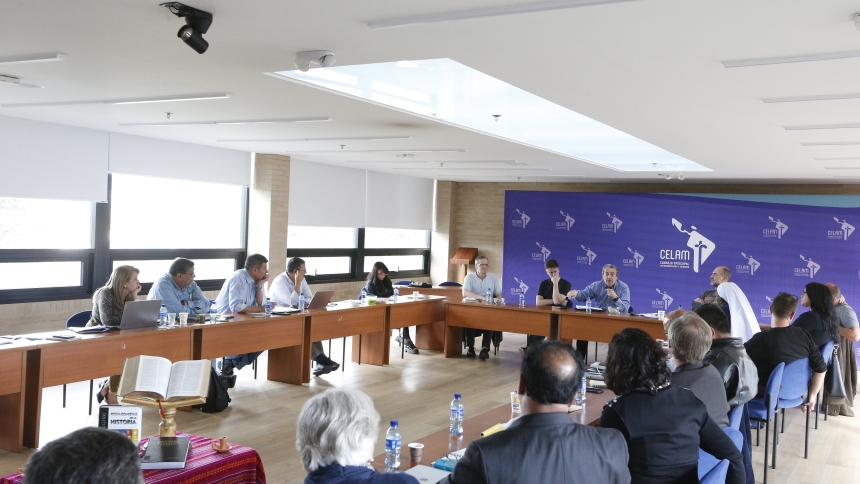
BOGOTÁ, Colombia (CNS) - Theologians, social scientists, historians and artists, including an Indigenous Mexican rapper, met in Bogotá to discuss how religion is represented in popular culture today.
Pope Francis "says that new theology cannot be a dialogue between theologians because that is self-referential, rather it must be an interdisciplinary dialogue," Emilce Cuda, secretary of the Pontifical Commission for Latin America told Catholic News Service Nov. 27 during a three-day conference in Bogotá on religious expressions in popular culture at the headquarters of the Latin American bishops' council, known as CELAM.
Theologians, she said, "must be among the people and listen to the language they use to express the faith today, to express their needs and dreams," and to engage with popular expressions of faith conveyed through tattoos and rap music, for instance.
The conference, titled "Theology on the Peripheries: The Symbolic Language of Popular Culture," featured panels on the use of religion in forming ideologies, media narratives surrounding religion, the appropriation of religious symbols and their representation in art.
Cuda said the conference was motivated by the need for an "outgoing theology" that aligns with a vision of an "outgoing church" as Pope Francis requested in a letter Nov. 1 approving new statutes for the Pontifical Theological Academy.
Felipe Legarreta, a biblical scholar at Loyola University of Chicago and conference participant, told CNS that studying the modern-day use of religious symbols follows the example of the early church fathers, who "appropriate symbols, appropriate languages to translate and interpret the Gospel message in new contexts."
Legarreta said he hoped the conference would support a "new epistemology and methodology for theology that is in dialogue with the other sciences and with the peoples of the earth, above all those who are on the peripheries."
Miguel Ángel Pérez Gómez, a rapper from Chiapas, Mexico, known by his stage name "Sebsor," said that his participation in the CELAM conference as an artist and as an Indigenous person was important "so that academics look at us, so they see that we exist, that we have a spirituality and to dialogue about it."
Pérez's songs incorporate both Spanish and his native Tzeltal, a Mayan language spoken by some 590,000 people. He told CNS that his music blends Mayan culture, Catholic spirituality and the message of resistance found in American hip-hop.
"If you're at a desk, you cannot understand the spirituality of a group of original peoples that was never conquered and continues to exist," he said. "Why hip-hop? Why has art saved us? Because it has been a means of social transformation in the peripheries."
Theology today can be overly concerned with "certain ways of preserving doctrine that place more attention on preservation than on proclamation" of the Gospel, Argentine Father José Carlos Caamaño told CNS.
A systmatic theologian at the Catholic University of Argentina, Father Caamaño said that preserving the faith through theology "cannot be motivated by tending to a body of work so that I can take decisions about others from a position of power."
"Knowing the challenges of our times is fundamental to be able to articulate a language that communicates the Gospel, otherwise what we communicate is a hollow doctrine, a dehumanizing doctrine," he said. "If you are worried about the salvation of people, you have to gain knowledge about them by using disciplines that know how to capture a concrete, historical reality," such as through collaboration with historians and sociologists.
Cuda said such an approach "is the way of understanding theology in part of Latin America, particularly in Río de la Plata," the region which encompasses Montevideo, Uruguay, and Buenos Aires, Argentina.
"In Latin America, theology of the peripheries is not a theology of philosophical categories, it is a theology mediated by culture," she said.
Caption: Participants speak during a theology conference on religious expressions in popular culture at the headquarters of the Latin American bishops' council, known as CELAM, in Bogotá, Colombia, Nov. 27, 2023. (CNS photo/Justin McLellan)
